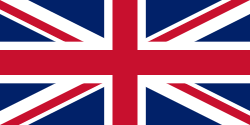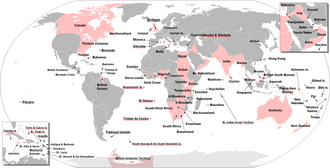British Empire
overseas possessions of England and later the United Kingdom (1607–1997) From Wikipedia, the free encyclopedia
Remove ads
The British Empire was the largest empire in world history and for a century was the largest global power. It included British dominions, colonies, protectorates, mandates, and other territories.
Remove ads
The Empire started with England's overseas possessions in the late 16th and the early 17th centuries. It grew into the largest empire the world has ever known during the 19th and the early 20th centuries.[1]
The British Empire was the first of the European powers to ban slavery and used the Royal Navy to suppress the Atlantic slave trade by the West Africa Squadron.[2]
By 1922, more than 458 million people lived in the colonies and territory of the British Empire, that was more than one fifth of the world's population at that time. The empire was larger than 33,700,000 km2 (13,012,000 sq mi), almost a quarter of the Earth's total land area.[3] The empire's large influence left a mark on many aspects of the modern world, with constitutional, legal, linguistic and cultural legacies. Called "the empire on which the Sun never sets"' it stood as a sign of British strength and dominance across the globe.
The Age of Discovery saw Portugal and Spain carving vast empires. This sparked England to create its own colonies and trade networks.[1] England, France and the Netherlands sought to harvest wealth and resources in the Americas and in Asia, with Britain eventually emerging as the dominate colonial power in North America and the Indian subcontinent.
In the 19th century, Britain's naval and imperial might surged to new heights and started a period of prosperity and peace that became known as Pax Britannica. The combination of trade from factories from the Industrial Revolution and shipping guarded by the Royal Navy was the basis of Britain's wealth.
Controlling a significant portion of world trade, Britain wielded economic influence over regions such as Asia and Latin America.[4] Some colonies earned greater autonomy and became dominions.
While challenges emerged as the 20th century dawned, Britain's spirit endured. Even in the face of increased competition from Germany and the United States in the early 20th century, the empire's legacy endured and shaped the course of world history.
World War I weakened the empire, and World War II accelerated the decline.[5] Also, the ideas of mechanisation and manufacture were becoming used in other countries. Labour costs, such as in China, were much lower than they were in Britain. It is possible that without World War II, Britain would still have been in control of manufacturing in large parts of the world, but one consequence of the war was the dominance of the United States and of China.
Decolonisation movements emerged in the post-war era and led to the granting of independence to many territories, including those in the Indian subcontinent.[6] However, the British Empire's influence endures since former colonies and dominions are in the Commonwealth of Nations, and many share the bond of a common monarch, now King Charles III.[7]
When Britain gave Hong Kong back to China on 1 July 1997, it marked the effective end of the British Empire. However, Britain still has some overseas territories.[8]
Remove ads
New empire
When the Thirteen Colonies became independent in the American War of Independence, the British Empire lost some of its oldest and most important colonies, but it kept colonies in what are now Canada and Florida, as well as in the Caribbean. Britain still had colonies and businesses in Asia, Africa, and the Pacific too. After defeating Napoleonic France in 1815, Britain became the world's only superpower for more than a century, and its empire became even larger.
The empire continued to expand during the 19th century. Ir would force the Chinese to give them the island of Hong Kong after the Opium Wars during the mid-19th century. During the Scramble for Africa, Britain gained much of Africa, especially in the south.
By the early 20th century, the economies of Germany and the United States had begun catching up to Britain, especially byindustrialisation. Britain allowed Canada, Australia, New Zealand and South Africa to be "self-governing dominions" by the time of the World War I. They could now pass their own laws in most matters and became independent countries in 1931.
World War I weakened Europe. Though the British Empire had been the most powerful economy before the war, it was quickly surpassed by the United States as the greatest industrial power after the war.
In World War II, Japan took the colonies of Britain and other European countries in Southeast Asia. The Allies eventually defeated Japan and took back their colonies, but Britain's prestige in Asia was damaged, which caused the Empire to decline more quickly.[9]
The British Raj included the whole of the Indian subcontinent.[10] The independence of India and Pakistan in 1947 was the first and most important step in decolonisation. In the following decade, Britain also gave independence to most of the territories of the British Empire. The colonial government hid and destroyed many documents about the empire, which it thought would give it a bad reputation.[11]
Remove ads
Abolishment of slavery
The Slavery Abolition Act abolished slavery in most of the British Empire on 1 August 1834. In the territories administered by the East India Company and Ceylon, slavery was ended in 1844.
Parliamentary reform in 1832 saw the influence of the East India Company decline. Under the 1833 Act, slaves were granted full emancipation after a period of four to six years of "apprenticeship".[12] Facing further opposition from abolitionists, the apprenticeship system was abolished in 1838.[13]
Remove ads
References
Other websites
Wikiwand - on
Seamless Wikipedia browsing. On steroids.
Remove ads



